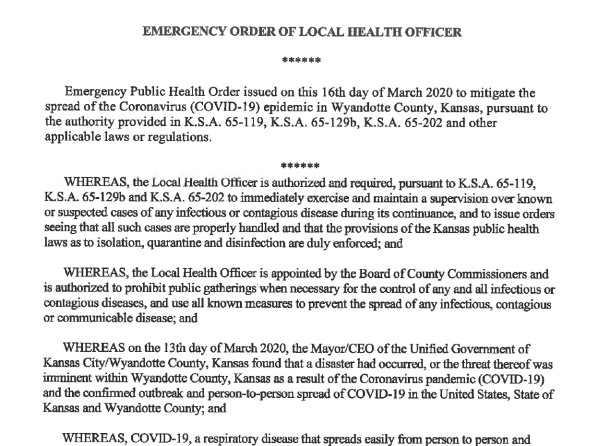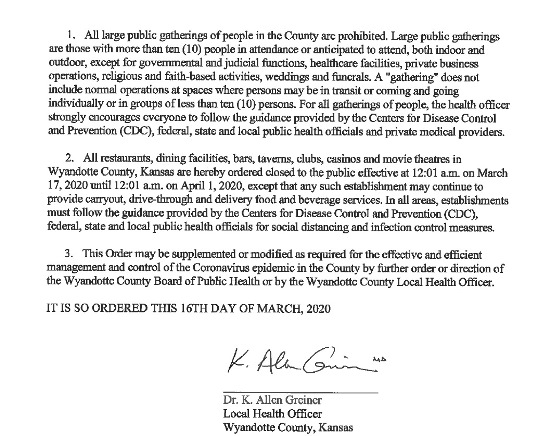

Restaurants in Wyandotte County and two other nearby counties will be closed to in-restaurant dining through April 1, while they will remain open for takeout food, because of the threat of the COVID-19 coronavirus, according to a Unified Government spokesman.
An emergency order was issued today by Dr. Allen Greiner, chief medical officer of Wyandotte County, according to David Reno, spokesman for the Unified Government.
Reno said the administrators of four local governments got together and decided to simultaneously issue emergency orders that will close restaurants, bars, taverns, clubs, casinos and movie theaters as of 12:01 a.m. Tuesday, March 17. After midnight tonight, the establishments will be closed until April 1, when the need for the order will be looked at again, according to the order.
Besides Wyandotte County, the local governments include Johnson County, Kansas; Kansas City, Missouri; and Jackson County, Missouri. Reno said Kansas City, Kansas, Mayor David Alvey has been highly involved in the decision-making process here.
“These measures are being taken with the intent of slowing the transmission of COVID-19 in an effort to increase public safety,” Reno said. “What we don’t want happening is COVID-19 to start exploding all over Wyandotte County, Johnson County, Jackson County or Kansas City, Missouri. Then our providers would become overwhelmed and people would not be able to receive the treatment they need. This is about slowing that transmission.”
According to the emergency order, restaurants and establishments may continue to offer “carryout, drive-through and delivery food and beverage services.”
The establishments must follow Centers for Disease Control and Prevention guidance, and other public health officials’ guidance for social distancing and infection control measures, according to the order.
The emergency order also stated that all large public gatherings of people in the county are prohibited, and that is defined as more than 10 people in attendance or anticipated to attend, both indoor and outdoor meetings.
There are exceptions to the gathering rule, and the exceptions include “governmental and judicial functions, healthcare facilities, private business operations, religious and faith-based activities, weddings and funerals.”
“A ‘gathering’ does not include normal operations at spaces where persons may be in transit or coming and going individually or in groups of less than 10 persons,” the order stated.
While the emergency order restricts gatherings at restaurants, it does not close a retail store such as Walmart or Nebraska Furniture Mart, Reno said. Also, grocery stores are not affected, he said. Industrial plants are not affected.
Residents can continue to use local restaurants through carryout, delivery and drive-through services, he said.
